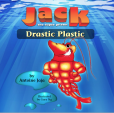
Showing 1181 - 1200 of 1645 results

Proposed Facility Access Terms and Conditions
ANSTO sets out the following terms and conditions relating to users who access our facilities for the purpose of research.

Jack the Super Prawn
Jack the Super Prawn lives in the Great Barrier Reef and uses his superpowers to protect the environment. With JackVac around his arms and JackPac on his back, he cleans up plastic pollution and impurities in the water. With JackCopter, he soars through the water and high into the air. Jack’s main job is to educate young readers on the impact of plastic and other types of pollution and to empower them to find a solution.
Created by Antoine Jaja, Jack’s first two adventure books entitled, “Drastic Plastic” and “Pollution Solution,” are now available in paperback in bookstores throughout Australia, as well as the ANSTO Shop. ANSTO has endorsed and was pleased to provide scientific input into the development of stories that are helping to raise awareness of the impact of pollution on our waterways and the marine environment.
ANSTO has a range of experts in environmental science, including Dr Tom Cresswell, who is undertaking research in this area and was able to provide scientific context and background to support the development of these adventure stories.
Antoine has developed a free “Jack the Super Prawn” video game on App Store and Google play, and a Teacher’s Guide Activities for children.

Role at ANSTO
Better predictions of the working life of industrial components
A revised model has been developed that can more accurately predict the actual service life of an industrial component.
Going global with nuclear medicine
Investigating the impact of radiation and radioactive contamination on forensic trace evidence
Celebrating Australian women in nuclear
Highlighting the contribution of four inspirational ANSTO leaders on International Women's Day.
Scientists from Indonesia visiting
Oportunity to to gain expertise on neutron instruments
Beam time allocations for the first half of 2016
Safe export of spent fuel
ANSTO can confirm it has completed its 9th successful export of spent fuel. The spent fuel, from OPAL, ANSTO’s multipurpose reactor, has gone to France for reprocessing.

Role at ANSTO
Gamma radiation imaging technology
A new imaging technology developed at ANSTO makes it possible to image, identify and locate gamma-ray radiation in a safe and timely manner.
Nuclear power technology explored
ANSTO shared expertise on next-generation reactors and nuclear power with sustainable energy experts at the Australian Academy of Science symposium in May.
Unusual state of matter in new material holds promise for transformative quantum technologies
ANSTO has provided supporting experimental evidence of a highly unusual quantum state, a quantum spin liquid (QSL), in a two-dimensional material.
Repatriation of Australian waste from France
New method PET radiotracers
Health researchers have developed a new method for producing PET radiotracers.
Interstellar measurements at ANSTO provide new insights into the formation of gold and other heavy elements
ANSTO’s Centre for Accelerator Science measures extra-terrestrial plutonium in a study to clarify the origin of the heavier elements
Tracing the impact of toxic metals
Two ANSTO environmental scientists are part of a large team led by the Australian National University (ANU), who have received an Australian Research Council Discovery Project grant to investigate how environmental change and human activities since industrialisation have impacted the transport and deposition of toxic metals on the south coast of Australia, Tasmania, and remote Southern Ocean islands.
Researchers uncover how pathogens hijack phosphate pathways to infect crops
A team of scientists from The Australian National University (ANU) has discovered how a powerful “weapon” used by many fungal pathogens enables them to cause disease in major food crops such as rice and corn